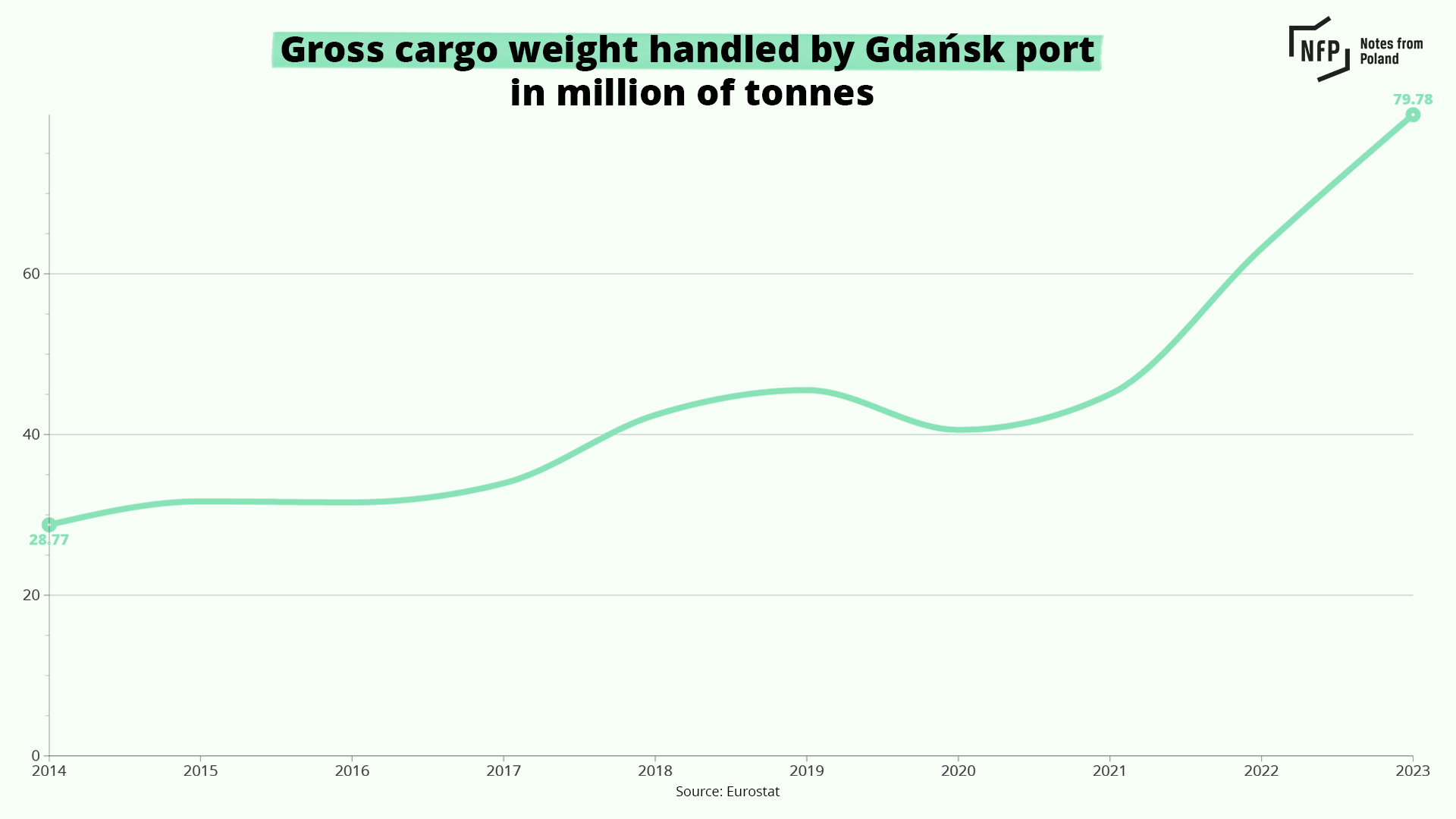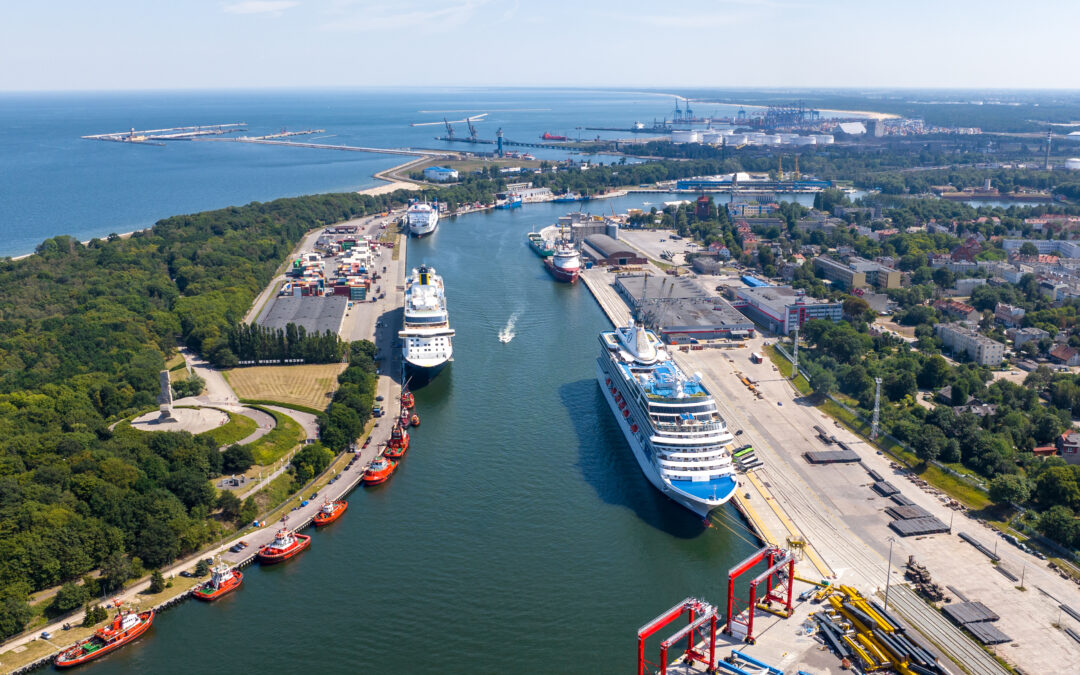Keep our news free from ads and paywalls by making a donation to support our work!

Notes from Poland is run by a small editorial team and is published by an independent, non-profit foundation that is funded through donations from our readers. We cannot do what we do without your support.
Gdańsk in Poland has become the EU’s fifth-busiest port, overtaking Algeciras in Spain and HAROPA in France. Only Amsterdam, Hamburg, Antwerp-Bruges and Rotterdam handled more cargo by weight than Gdańsk, according to the latest Eurostat data, which relate to 2023.
Meanwhile, national data for 2024 show that Poland’s ports again reported record financial and operational results, underscoring the country’s growing role in maritime logistics.

In recent years, the port of Gdańsk has experienced unprecedented growth. According to Eurostat, in 2023 the port handled 69.78 million tonnes of cargo, 26% more than in 2022.
This also represents a 177% rise since 2014, driven by investments in infrastructure as well as the Baltic Sea’s role as a key transit hub for energy supplies and its increasing importance for global logistics.
In 2021, Gdańsk became the EU’s biggest port on the Baltic Sea in terms of cargo handling, overtaking Lithuania’s Klaipėda. Overall, it remains the second-biggest Baltic port behind only Ust-Luga in Russia.

Since Russia’s full-scale invasion of Ukraine, the Baltic Sea has become even more important as a route for the supply of energy resources – such as liquefied natural gas (LNG) from the United States and Qatar – and for delivering humanitarian and military aid to Ukraine.
As a result, in 2022, Gdańsk recorded the EU’s second-highest growth in tonnes of cargo handled. Data presented by the Polish government last week show that the solid growth of Gdańsk and other Polish seaports continued last year, with record financial and operational results.
The net profit of Poland’s ports rose 26% year-on-year, reaching a combined total of more than 551.7 million zloty (€129.3 million). They handed 3.27 million TEUs (twenty-foot equivalent units) of containers last year, up 9.3% from 2023.
Cargo throughput also remained robust, with Polish ports handling almost 126 million tonnes of cargo, excluding coal, in 2024, matching the record set in 2023, said deputy infrastructure minister Arkadiusz Marchewka.
He explained that coal was excluded from the statistics because its imports in 2023 were “excessive” and stocks are still sitting in the ports.
The port of Gdynia saw the largest growth in profits, of 32%, followed by Gdańsk (24%) and Szczecin-Świnoujście (23%). However, the biggest growth in containers handled was in Szczecin-Świnoujście (11.4%), followed by Gdańsk (9.7%) and Gdynia (8.3%).
Poland plans to develop a deepwater container port within a protected nature reserve on the Baltic coast.
Supporters point to potential economic gains but critics, both locally and in Germany, have raised concerns over the environmental impact https://t.co/nDBvs6zxW0
— Notes from Poland 🇵🇱 (@notesfrompoland) May 31, 2024
Infrastructure minister Dariusz Klimczak, who spoke alongside Marchewka, announced that the government has allocated a record 2 billion zloty (€469 million) in the 2025 budget for maritime investments.
Key projects currently underway include a deep-water container terminal in Świnoujście, which Klimczak said will “strengthen the Szczecin-Świnoujście seaport complex and become one of the most modern in Europe”. The project is expected to be completed by 2028.
Work is also in progress on a grain terminal in Gdańsk – which will increase storage capacity fivefold and raise reloading capacity from 700,000 tonnes annually to nearly 3 million tonnes – and a floating LNG terminal.
Additionally, efforts are progressing to develop the port of Elbląg. The ministry confirmed that the Elbląg waterway to the Gulf of Gdańsk is being deepened, which will enable it to function as a seaport. The project is set to be completed by the second quarter of 2026.

Source: Eurostat

Notes from Poland is run by a small editorial team and published by an independent, non-profit foundation that is funded through donations from our readers. We cannot do what we do without your support.
Main image credit: Port Gdańsk

Alicja Ptak is deputy editor-in-chief of Notes from Poland and a multimedia journalist. She has written for Clean Energy Wire and The Times, and she hosts her own podcast, The Warsaw Wire, on Poland’s economy and energy sector. She previously worked for Reuters.



















